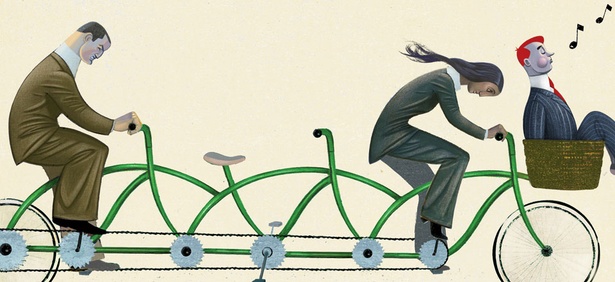11.2 Cooperation and Intergroup Relations

Animals are known to cooperate with members of their group, but humans are also known to cooperate with each other.
Cooperation refers to the ability of humans to work together toward common goals and is required for survival. Groups with better member cooperation were more likely to survive (Bowles et al., 2012). As we learned earlier, cooperation occurs in non-human primates (e.g., chimpanzees, bonobos). Still, it is almost exclusively limited to kin and is almost never extended to strangers (Melis & Semmann, 2010). Some psychologists believe that complex cooperation among humans is related to psychological processes like empathy, trust, group identity, memory, shared intentionality, and culture (Matsumoto & Juang, 2013; Moskowitz & Piff, 2020).
Our ability to understand someone’s emotional experience, defined as empathy, occurs when we take on the person’s perspective and try to understand his or her point of view. When empathizing with a person in distress, the natural desire to help is often expressed as a desire to cooperate. Trust is the belief that another person’s actions will be beneficial to one’s own interests (Kramer, 1999), which enables us to work together as a single unit. Regarding cooperation, trust is necessary and critical (Chaudhuri et al., 2002; Parks et al., 1996; Pruitt & Kimmel, 1977); however, our willingness to trust others depends on their actions and reputation. One common example of the difficulties in trusting others you might be familiar with is a group project for a class. Many students dislike group projects because they worry about social loafing, the way that one person expends less effort but still benefits from the group’s efforts.
Over time, individuals develop a reputation for helping or for loafing. The willingness to cooperate with others depends on their prior actions, reputation, and our memory of the events. Nowak and Sigmund (1998) demonstrated with a mathematical model that a person with a reputation for helping gets help later on, regardless of whether they provided help to you directly in the past. A study that used an economic game found that as the game progressed, donations (help) were more frequently given to individuals who had been generous in earlier rounds of the game (Wedekind & Milinski, 2000). Individuals perceived as cooperative gained a reputational advantage, earning them more willing partners and a larger overall monetary reward.
Cultural differences in beliefs about the goodness of people can be seen as a measure of trust. High trust refers to positive expectations about the behaviors of others, such as returning a lost wallet, while low trust refers to negative expectations, like keeping a lost wallet. For example, in Japan, a high-trust society, if someone finds a wallet on the street, they are likely to take it to the nearest police station, expecting that others would do the same for them. Conversely, in a low-trust society, the finder might keep the wallet, assuming others would do the same.
High-trust societies are more likely to cooperate without the need for sanctions (punishments). For instance, in Scandinavian countries, which are known for high levels of trust, people often leave their babies in strollers outside cafes while they dine inside, trusting that no harm will come to them. However, there is significant variation in cooperation across cultures. Factors such as social norms, a country’s gross domestic product (GDP), and individual reputation (whether someone has helped in the past) can moderate the willingness to sanction group members (Gächter et al., 2010; Balliet & Van Lange, 2013).
The Prisoner’s Dilemma Explained in One Minute. (open YouTube video in new tab)
Economists and psychologists often use the Prisoner’s Dilemma to examine cooperation and competition in experimental studies. It gets its name from the situation in which two prisoners who have committed a crime are given the opportunity to either (A) both confess their crime (and get a moderate sentence), (B) rat out their accomplice (and get a lesser sentence), or (C) both remain silent (and avoid punishment altogether). Psychologists use various forms of the prisoner’s dilemma scenario to study self-interest and cooperation. Whether framed as a monetary game or a prison game, the prisoner’s dilemma illuminates a conflict at the core of many decisions to cooperate: it pits the motivation to maximize personal reward against the motivation to maximize gains for the group (you and your partner combined).
For someone trying to maximize his or her own personal reward, the most “rational” choice is to defect (not cooperate), because defecting always results in a larger personal reward, regardless of the partner’s choice. However, when the two participants view their partnership as a joint effort (such as a friendly relationship), cooperating is the best strategy of all, since it provides the largest combined sum of money ($10—which they share), as opposed to partial cooperation ($8), or mutual defection ($4). In other words, although defecting represents the “best” choice from an individual perspective, it is also the worst choice to make for the group as a whole. This divide between personal and collective interests is a key obstacle that prevents people from cooperating. As is frequent in these types of scenarios, even though cooperation may benefit the whole group, individuals are often able to earn even larger, personal rewards by defecting—as demonstrated in the prisoner’s dilemma example above.

Yamagishi (1986, 1988) categorized Japanese and American participants into low-trust and high-trust categories and then asked them to participate in an experiment where they could give other participants money (a variation of the prisoner’s dilemma). High-trusters provided more cooperation without the presence of sanctions, and low-trusters provided more cooperation with sanctions. Culture variation in levels of trust (high/low) is present within and across cultures. It appears that across cultures, punishment promotes cooperation of social loafers in societies with high trust more than low trust societies (Balliet & Van Lange, 2013). High-trust cultures are more willing to punish social loafers. Low-trust cultures may not share the social norm of ‘no free rides,’ so punishment isn’t going to work in those situations.

Social norms determine cultural levels of cooperation, and consequently, whether social loafing is punished or sanctioned.
Group identification can strongly influence cooperation, and people are generally reluctant to cooperate with members of an out-group, or those outside the boundaries of one’s own social group (Allport, 1954). Matsumoto and Hwang (2011) used the Prisoner’s Dilemma to examine whether cultural differences were related to intercultural (between-culture) competition and cooperation. Researchers used the prisoner’s dilemma to test their hypothesis. Students were paired as same-sex and same ethnicity, or same-sex but different ethnicity. The pairs with different ethnicities had fewer cooperative behaviors and more competitive behaviors.
Using a variation of the Prisoner’s Dilemma among small-scale subsistence societies revealed that the interdependence of a group (i.e., relying on one another for survival) predicted the likelihood of cooperation. For example, among the people of the Lamelara in Indonesia, who survive by hunting whales in groups of a dozen or more individuals, donations in the ultimatum game were extremely high, approximately 58% of the total sum. In contrast, the Machiguenga people of Peru, who are generally economically independent at the family level, donated much less on average, about 26% of the total sum. Therefore, the interdependence of people for survival seems to be a key component of why people cooperate with others (Henrich et al., 2001).
Cooperation is an important part of our everyday lives, and even though cooperation can sometimes be difficult to achieve, certain practices, such as emphasizing shared goals and engaging in open communication, can promote teamwork and even break down rivalries. Though choosing not to cooperate can sometimes achieve a larger reward for an individual in the short term, cooperation is often necessary to ensure that the whole group succeeds.
Test your understanding
Media Attributions
- pexels-wolfgang-weiser-467045605-21348313 © Wolfgang Weiser is licensed under a CC BY-SA (Attribution ShareAlike) license
- sketchplanations-the-prisoners-dilemma is licensed under a CC BY-NC (Attribution NonCommercial) license
- Govexec-full-width (1) © EDCU320RHT is licensed under a CC BY-SA (Attribution ShareAlike) license

